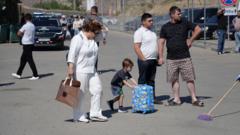In the remote Agarak border crossing between Armenia and Iran, a stark reality unfolds as families rush to escape the rising conflict that has clouded their homeland. The sun beats down on the dry, barren landscape, a setting that offers little comfort to those who arrive after long hours of travel. Among the crowd, a woman, stylishly coiffed yet clearly distressed, clutches her infant as her husband haggles with taxi drivers for transportation. Nearby, another family, unexpectedly caught in the chaos, is returning to their residence in Austria.
Reports from the border indicate that many who are crossing possess citizenship elsewhere, making a break from a nation increasingly marred by the conflict between Israel and Iran, which has extended into its eighth day. "Today I witnessed the aftermath of an attack," remarked a father from Tabriz, visibly shaken. “The fear is palpable; each corner feels like a risk,” he added, highlighting the deep anxiety that permeates the atmosphere.
The conflict intensified on June 13, starting with a barrage of Israeli strikes on Iranian military infrastructure and populated regions. According to the Human Rights Activists News Agency, upwards of 657 Iranians have reportedly lost their lives in this ongoing struggle. Iran has retaliated with missile launches towards Israeli territories, further escalating the situation.
As many as 10 million residents of Tehran have begun leaving the city amid warnings and ongoing threats from Israel. The traffic leading out of the capital is heavy, with families anxiously seeking safety. A young Afghan man shared his harrowing escape, stating that flights had been canceled, forcing him to navigate a perilous land route. “The noise of bombs was a nightly occurrence,” he recounted, underscoring the unrelenting distress faced by those remaining in Tehran.
Amid this turmoil, some were just enjoying summer vacations in Iran. A young woman, now keen to return to Australia, conveyed a shared traumatic experience. “It’s hard to discuss, but how can anyone feel at home when your country is attacked?” she said while boarding transport to Yerevan.
The discourse around the potential collapse of Iran's regime has arisen amongst Israeli officials; however, opinions differ widely. Javad, a summer visitor from Germany, remains defiant, asserting that Israel’s aggression would not lead to Iran's downfall: “Israel is not a friend; they need to rectify their own issues.”
Interestingly, not all Iranians at the border were fleeing. Some, like Ali Ansaye, a tourist in Armenia, were heading back to Tehran without fear. “If my time has come, it will be in my homeland,” he declared, questioning the legitimacy of Israeli nuclear capabilities compared to Iran’s peaceful pursuits.
The situation at the Agarak border highlights a critical intersection of humanity facing tumultuous change, illustrating the profound impact of geopolitical conflict on everyday lives across nations.
Reports from the border indicate that many who are crossing possess citizenship elsewhere, making a break from a nation increasingly marred by the conflict between Israel and Iran, which has extended into its eighth day. "Today I witnessed the aftermath of an attack," remarked a father from Tabriz, visibly shaken. “The fear is palpable; each corner feels like a risk,” he added, highlighting the deep anxiety that permeates the atmosphere.
The conflict intensified on June 13, starting with a barrage of Israeli strikes on Iranian military infrastructure and populated regions. According to the Human Rights Activists News Agency, upwards of 657 Iranians have reportedly lost their lives in this ongoing struggle. Iran has retaliated with missile launches towards Israeli territories, further escalating the situation.
As many as 10 million residents of Tehran have begun leaving the city amid warnings and ongoing threats from Israel. The traffic leading out of the capital is heavy, with families anxiously seeking safety. A young Afghan man shared his harrowing escape, stating that flights had been canceled, forcing him to navigate a perilous land route. “The noise of bombs was a nightly occurrence,” he recounted, underscoring the unrelenting distress faced by those remaining in Tehran.
Amid this turmoil, some were just enjoying summer vacations in Iran. A young woman, now keen to return to Australia, conveyed a shared traumatic experience. “It’s hard to discuss, but how can anyone feel at home when your country is attacked?” she said while boarding transport to Yerevan.
The discourse around the potential collapse of Iran's regime has arisen amongst Israeli officials; however, opinions differ widely. Javad, a summer visitor from Germany, remains defiant, asserting that Israel’s aggression would not lead to Iran's downfall: “Israel is not a friend; they need to rectify their own issues.”
Interestingly, not all Iranians at the border were fleeing. Some, like Ali Ansaye, a tourist in Armenia, were heading back to Tehran without fear. “If my time has come, it will be in my homeland,” he declared, questioning the legitimacy of Israeli nuclear capabilities compared to Iran’s peaceful pursuits.
The situation at the Agarak border highlights a critical intersection of humanity facing tumultuous change, illustrating the profound impact of geopolitical conflict on everyday lives across nations.

















